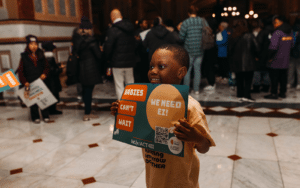On July 1st, 2026, the new Illinois Department of Early Childhood (IDEC) will officially administer our state’s early childhood programs and services and child care licensing will move from the Department of Children and Family Services (DCFS) to IDEC. In the meantime, IDEC officials are busy not only planning the transition to ensure a smooth launch, but they have also set redesigning Illinois’s licensing system as a priority over the next year.
Start Early believes that by improving some basic child care licensing functions now, IDEC could turn their focus to important long-term aspects of reforming child care licensing. Therefore, in response to years of child care educators’ complaints and concerns with our current licensing system, Start Early introduced House Bill (HB) 3439. This bill provided common-sense solutions to improve licensing functions and reduce the state’s background check processing delays, which have been a constant problem for several years and there simply haven’t been any significant improvements from the state.
According to a survey conducted by Start Early, child care directors are consistently waiting more than 5 weeks for background check clearances for prospective staff. In neighboring states like Iowa, full background check clearances are typically issued within one week. In Wisconsin, there’s a portal that allows prospective staff to request background checks and simplifies the submission of documents. Without a streamlined background check process in Illinois that is transparent, efficient and easy to navigate, child care directors will continue to lose qualified staff to other industries.

